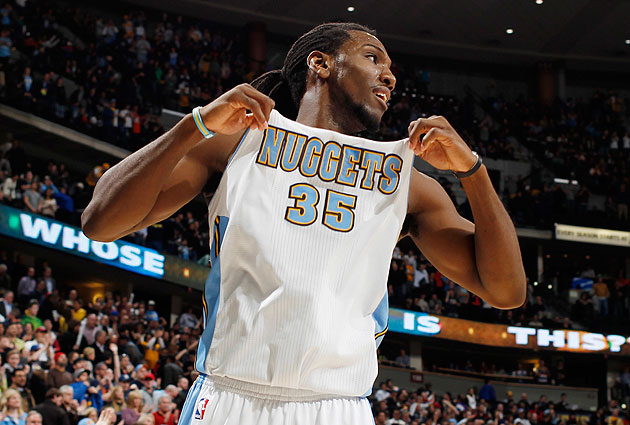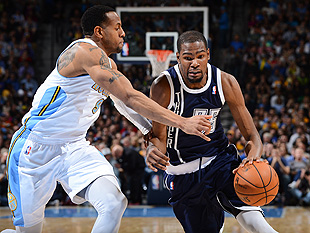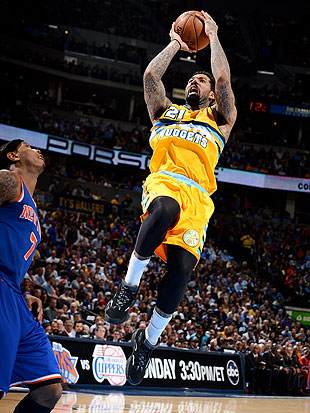
The Miami Heat have gotten an awful lot of publicity here and elsewhere of late, and understandably so; this is the kind of thing that tends to happen when you win 23 straight games and look for all the world like a legitimate threat to the 1971-72 Los Angeles Lakers' all-time record of 33 consecutive wins. That's the sort of thing people talk about.
And yet, quiet as it's kept, another NBA team's run up a pretty amazing streak of their own over the past month — under cover of West Coast tip-time darkness, George Karl's go-go Denver Nuggets have rung up 12 straight victories, extending their streak in thrilling fashion on Monday with a controversial overtime victory over the Chicago Bulls. On Tuesday, the 46-22 Nuggets — who are just percentage points behind the Memphis Grizzlies (who, as we noted earlier today, have been on a pretty good run of their own) for the No. 4 seed in the Western Conference — look to make it a baker's dozen when they travel to Chesapeake Energy Arena to take on Kevin Durant, Russell Westbrook and the reigning Western champions, the Oklahoma City Thunder, in NBA TV's weekly "Fan Night" broadcast.
It will be a stiff test for the Nuggets, to be sure, but one they could be well equipped to handle; not only have they already beaten the Thunder during their 12-game run, but a look at the numbers suggests that we're now seeing perhaps the highest-performing Denver squad that Karl's ever had. Let's take a look at a handful of elements that have gone into fueling Denver's winning streak.
1. The Nuggets' offense has been insane during this 12-game stretch. Denver's leading the league in field-goal percentage during the streak, shooting a sterling 51.1 percent from the floor as a team, ranking third in the NBA in Effective Field Goal Percentage, which accounts for the fact that 3-pointers are worth more than 2-pointers, and eighth in True Shooting Percentage, which also factors in the value of free throws. Neither the long ball nor the freebie have factored hugely into Denver's success, though; since Feb. 23, only two teams have generate a smaller share of their total scoring output from 3 than Denver (the Minnesota Timberwolves and Memphis Grizzlies) and only five teams have relied less on scoring at the line (Philadelphia, Dallas, Atlanta, Orlando and the Clippers).
Despite that very-un-Houston-Rockets-y decision to eschew the charity stripe and 3-pointers, Denver has scored an average of 111.9 points per 100 possessions over its past 12 game. That's a significant leap in offensive efficiency over the Nuggets already very good full-season mark (107.6-per-100, third-best in the league); over the course of the regular season, that 111.9 number would set the Nuggets apart as the best offense in the league. And yet it's only the second-best mark since Feb. 23, trailing — oddly enough — the Portland Trail Blazers, who've roasted opposing defenses to the tune of 112.6 points per 100 possessions over their past 11 games, thanks in large part to hanging 125 on the Charlotte Bobcats and putting 136 on the San Antonio Spurs a couple of weeks back.
 2. The D's been pretty stout, too. The big question heading into the season was whether Denver's defense could improve enough to rank in the top half of the league in points allowed per possession. They were just above the middle-of-the-pack before the streak, which was a pretty strong accomplishment in and of itself, but they've been a top-five defense during their 12-game run, allowing just 98.2 points per 100 possessions; over the course of the full season, that would be the third-best mark in the league, ranking just underneath the Indiana Pacers and Memphis Grizzlies. They're holding opponents to 43.9 percent shooting from the field, the league's seventh-lowest percentage, and rank 10th in defending the 3-point line, too (34.7 percent).
2. The D's been pretty stout, too. The big question heading into the season was whether Denver's defense could improve enough to rank in the top half of the league in points allowed per possession. They were just above the middle-of-the-pack before the streak, which was a pretty strong accomplishment in and of itself, but they've been a top-five defense during their 12-game run, allowing just 98.2 points per 100 possessions; over the course of the full season, that would be the third-best mark in the league, ranking just underneath the Indiana Pacers and Memphis Grizzlies. They're holding opponents to 43.9 percent shooting from the field, the league's seventh-lowest percentage, and rank 10th in defending the 3-point line, too (34.7 percent).
That makes Denver one of just two teams to have boasted a top-five offense and defense over the past 25 days, which is great news for Nuggets fans ... but would probably seem greater if the other one wasn't the Thunder, who trail Denver by a teeny-tiny bit on the offensive end (scoring 111.8-per-100 over the past 12 games) and have been even better defensively (giving up 96.5-per-100, best in the league).
3. Basically, the Nuggets are just doing the kinds of things they've been doing all year more and better. Denver's eighth in the league in assist ratio (17.9 dimes dished per 100 possessions) this season; they're up to 19.5-per-100 during the streak. All season, they've been a team that's thrived on creating mistakes (forcing turnovers on 16 percent of opponents' possessions, ninth in the league) and scoring off them (19.6 points off TOs, best in the league); over the last 12 games, they're forcing TOs on to 17.2 percent of possessions and scoring 21.5 points per game off them.
They're running more, adding an average of one more possession per game to their already-second-in-the-league pace, and cashing in on the break more frequently, scoring 23.3 points per game on the break compared to 19.8 over the full season. But they're not letting opponents take advantage of the uptempo game to get easy ones on the other end; Denver's allowing the third-fewest opponent fast-break points per game, at just 10.4.
And while we know they've been attacking the rim all season, scoring a league-best 57.8 points per game in the paint, they've been especially crazy with it during the streak, averaging a whopping 63.3 points in the paint over the last 12 games. That's a full 14 more points per game than the next most lane-dependent crew, the Sacramento Kings, who have also been the only team to play faster than the Nuggets over the past three-plus weeks. (The lesson: It's not enough just to be fast; you have to be smart, well-drilled, talented and deep.)
 4. About that depth ... Seven players are averaging at least 10 points per game during this streak, led by Ty Lawson's 19.3 points per game. The reserves are really giving Denver a massive boost, with Wilson Chandler leading the way — he's rounding into form nicely as something like the perfect two-way stretch power forward for Karl's system, averaging 15.6 points per game and shooting a red-hot 51.6 percent from 3-point land over the last 12 games. (He's also posted two 35-point games off the Nuggets' bench — one last night against the Bulls and another back on March 1 against OKC.) Chandler's strong play and increased workload has led to a decline in playing time and impact for sophomore spark-plug Kenneth Faried, but the Manimal's still kicking in 10.2 points, 8.2 boards and more than a block, an assist and a steal in 24 minutes per contest.
4. About that depth ... Seven players are averaging at least 10 points per game during this streak, led by Ty Lawson's 19.3 points per game. The reserves are really giving Denver a massive boost, with Wilson Chandler leading the way — he's rounding into form nicely as something like the perfect two-way stretch power forward for Karl's system, averaging 15.6 points per game and shooting a red-hot 51.6 percent from 3-point land over the last 12 games. (He's also posted two 35-point games off the Nuggets' bench — one last night against the Bulls and another back on March 1 against OKC.) Chandler's strong play and increased workload has led to a decline in playing time and impact for sophomore spark-plug Kenneth Faried, but the Manimal's still kicking in 10.2 points, 8.2 boards and more than a block, an assist and a steal in 24 minutes per contest.
Karl has gotten huge contributions in the middle, where Kosta Koufos and JaVale McGee are both making well over 60 percent of their shots and combining for just under 18 points, 13 rebounds and four blocks in 39 minutes per game. He's found production on the wing, where Andre Iguodala's numbers (minutes, points, assists, rebounds, steals, blocks, field-goal and 3-point percentage) are up across the board and Corey Brewer's combination of fast-break offense (13.5 points during the streak) and sticky defense (two steals in 24.4 minutes per game) have fortified a perimeter defense that was all-too-porous a year ago. And he's gotten offensive output at the point, where Lawson (just under 50 percent from the floor and 37.5 percent from 3 over his last 12) and veteran Andre Miller (8.8 points and 6.6 assists in 25 minutes per game, making better than 56 percent of his shots and nearly 89 percent of his free throws) have kept Karl's high-powered offense humming from opening tip to final buzzer.
Denver has long relied on a many-hands-make-light-work approach, but rarely has it ever seemed to work this effectively, this fluidly ... this perfectly.
5. But the schedule sends us mixed signals about how much it all really means. And yet ...
Remember how good the Denver defense has been of late, from Thing No. 2? Well, seven of the Nuggets' last 12 opponents have ranked in the bottom half of the league in offensive efficiency this season, and one of the five top-15 squads — the Knicks — lost Carmelo Anthony and Tyson Chandler to injury before game's end. In the other four, Denver held the opponent down twice and just flat-out outscored them twice.
And while two of the games have gone to overtime, only four of the 12 have been within five points in the last five minutes at any point, for a grand total of 23 minutes of "clutch" game time; that might lend an old-school sort to wonder how Denver's likely to fare in tight games. Then again, they've won all four of them, and have won seven of the 12 by more than 10 points, calling to mind Rockets general manager Daryl Morey's line about good teams and close contests.
Denver has beaten seven (current) playoff teams during its run — the Lakers, Thunder, Hawks, Clippers, Knicks, Grizzlies and, last night, the Bulls, which is pretty impressive. But six of those seven wins have come at the friendly, high-altitude confines of the Pepsi Center, where the Nuggets are a stellar 30-3 this season and haven't lost in two months, since the Washington Wizards surprisingly took them down in John Wall's fourth game back. Of Denver's five road wins, four have come against lottery teams, including three of the five worst teams in the league (Charlotte, Sacramento and Phoenix).
The Nuggets will be on the road tonight against the Thunder, a team that's been arguably as dominant as they themselves have been over these last 25 days — Oklahoma City's 10-2 in its last 12 and has outscored opponents by a staggering 15.4 points per 100 possessions, tops in the league — and that waxed Denver by 20 the last time the two teams squared off at Chesapeake Energy Arena. Then again, that was the back end of a back-to-back for Denver following an overtime win; then again, so is this. If Karl's squad can pull this one off and extend its winning streak to a lucky 13, we'll likely have a whole new slew of things about Denver to discuss — namely, how much more dangerous they are than we might previously have thought.
No comments:
Post a Comment